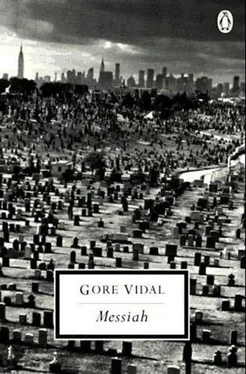Gore Vidal - Messiah
Здесь есть возможность читать онлайн «Gore Vidal - Messiah» весь текст электронной книги совершенно бесплатно (целиком полную версию без сокращений). В некоторых случаях можно слушать аудио, скачать через торрент в формате fb2 и присутствует краткое содержание. Жанр: Современная проза, на английском языке. Описание произведения, (предисловие) а так же отзывы посетителей доступны на портале библиотеки ЛибКат.
- Название:Messiah
- Автор:
- Жанр:
- Год:неизвестен
- ISBN:нет данных
- Рейтинг книги:3 / 5. Голосов: 1
-
Избранное:Добавить в избранное
- Отзывы:
-
Ваша оценка:
- 60
- 1
- 2
- 3
- 4
- 5
Messiah: краткое содержание, описание и аннотация
Предлагаем к чтению аннотацию, описание, краткое содержание или предисловие (зависит от того, что написал сам автор книги «Messiah»). Если вы не нашли необходимую информацию о книге — напишите в комментариях, мы постараемся отыскать её.
Messiah — читать онлайн бесплатно полную книгу (весь текст) целиком
Ниже представлен текст книги, разбитый по страницам. Система сохранения места последней прочитанной страницы, позволяет с удобством читать онлайн бесплатно книгу «Messiah», без необходимости каждый раз заново искать на чём Вы остановились. Поставьте закладку, и сможете в любой момент перейти на страницу, на которой закончили чтение.
Интервал:
Закладка:
Against my will and judgment and inclination, I found myself absorbed by the man, not able to move or to react. The same magic which was always to affect me, even when later I knew him only too well, held me fixed to my chair as the words, supported by the clear voice, came in a resonant line from him to me alone, to each of us alone, separate from the others… and both restless mass and fast-breathing particular were together his.
The moment itself lasted only a second in actual time; it came suddenly, without warning: one was riven; then it was over and he left the chapel, left us chilled and weak, staring foolishly at the gilt chair where he had been.
It was some minutes before we were able to take up our usual selves again.
Iris looked at me. I smiled weakly and cleared my throat: I was conscious that I ached all over. I glanced at my watch and saw that he had spoken to us for an hour and a half during which time I had not moved. I stretched painfully and stood up. Others did the same: we had shared an experience and it was the first time in my life that I knew what it was like to be the same as others, my heart's beat no longer individual, erratic, but held for at least this one interval of time in concert with those of strangers. It was a new, disquieting experience: to be no longer an observer, a remote intelligence… for ninety minutes to have been a part of the whole.
Iris walked with me to the anteroom where we stood for a moment watching the others who had also gathered here to talk in low voices, their expressions bewildered.
She did not have to ask me what I thought. I told her immediately, in my own way, impressed but less than reverent. "I see what you mean. I see what it is that holds you, fascinates you but I still wonder what it is really all about."
"You saw. You heard."
"I saw an ordinary man. I heard a sermon which was interesting, although I might be less impressed if I read it to myself…" Deliberately I tried to throw it all away, that instant of belief, that paralysis of will, that sense of mysteries revealed in a dazzle of light. But as I talked, I realized that I was not really dismissing it, that I could not alter the experience even though I might dismiss the man and mock the text: something had happened and I told her what I thought it was.
"It is not truth, Iris, but hypnosis."
She nodded. "I've often thought that. Especially at first when I was conscious of his mannerisms, when I could see, as only a woman can perhaps, that this was just a man; yet something does happen when you listen to him, when you get to know him. You must find that out for yourself; and you will. It may not prove to be anything which has to do with him. There's something in oneself which stirs and comes alive at his touch, through his agency." She spoke quickly, excitedly. I felt the passion with which she was charged. But suddenly it was too much for me. I was bewildered and annoyed; I wanted to get away.
"Don't you want to meet him?"
I shook my head. "Another time maybe, but not now. Shall I take you back?"
"No. I'll get a ride in to Santa Monica. I may even stay over for the night. He'll be here a week."
I wondered again if she might have a personal interest in Cave: though I doubted it, anything was possible.
She walked me back to the car, past the lighted chapel, over the summery lawn, down the dark street whose solid prosaicness helped to dispel somewhat the madness of the hour before.
We made a date to meet later on in the week. She would tell Cave about me and I would meet him. I interrupted her then. "What did he say, Iris? What did he say tonight?"
Her answer was as direct and as plain as my question.
"That it is good to die."
Four
1
This morning I reread the last section, trying to see it objectively, to match what I have put down with the memory I still bear of that first encounter with John Cave. I have not, I fear, got it. But this is as close as I can come to recalling long-vanished emotions and events.
I was impressed by the man and I was shaken by his purpose. My first impression was, I think, correct: he was a born hypnotist and the text of that extraordinary message was, in the early days at least, thin, illogical and depressing if one had not heard it spoken. Later of course I, among others, composed the words which bear his name and we gave them, I fancy, a polish and an authority which, with his limited education and disregard for the works of the past, he could not have accomplished on his own, even had he wanted to.
I spent the intervening days between my first and second encounters with this strange man in a state of extreme tension and irritability. Clarissa called me several times but I refused to see her, excusing myself from proposed entertainments and hinted tête à têtes , with an abruptness which anyone but the iron-cast Clarissa would have found appallingly rude. She said she understood, however, and she let me off without explaining what it was she understood, or thought she did. I avoided a number of parties and all acquaintances, keeping to my hotel room where I contemplated a quick return to the Hudson and to the darkening autumn.
Iris telephoned me twice and, when she fixed a day at last for me to meet John Cave, I accepted her invitation, a little to my own surprise.
We met in the late afternoon at her house. Only the three of us were present on that occasion. In the set of dialogues which I composed and published in later years I took considerable liberties with our actual conversations, especially this first one: in fact, as hostile critics were quick to suggest, the dialogues were created by me with very little of Cave in them and a good deal of Plato, rearranged to fit the occasion. In time, though, my version was accepted implicitly, if only because there were no longer any hostile critics.
Iris served us tea in the patio. She spoke seldom and, when she did, her voice was low and curiously diffident as she asked Cave some question or instructed me.
Cave himself was relaxed, quite different from my first view of him. In fact, I might not even have recognized his face had I seen him in a group.
He rose promptly when I came out onto the patio; he shook my hand vigorously but briefly and sat down again, indicating that I sit next to him while Iris went for tea. He was smaller and more compact than I'd thought measuring him against myself as one does, unconsciously, with an interesting stranger. He wore a plain brown suit and a white shirt open at the collar, a modified Lord Byron collar which became him. The eyes, which at first I did not dare look at, were, I soon noticed, sheathed… an odd word which was always to occur to me when I saw him at his ease, his eyes half-shut, ordinary, not in the least unusual. Except for a restless folding and unfolding of his hands (suggesting a recently reformed cigarette smoker) he was without physical idiosyncrasy.
"It's a pleasure to meet you" were the first words, I fear, John Cave ever spoke to me; so unlike the dialogue on the spirit which I later composed to celebrate this initial encounter between master and disciple-to-be. "Iris has told me a lot about you." His voice was light, without resonance now. He sat far back in his deck chair. Inside the house I could hear Iris moving plates. The late afternoon sun had just that moment gone behind trees and the remaining light was warmly gold.
"And I have followed your… career with interest too," I said, knowing that "career" was precisely the word he would not care to hear used but, at that moment, neither of us had got the range of the other. We fired at random.
"Iris told me you write history."
I shook my head. "No, I only read it. I think it's all been written anyway." I was allowed to develop this novel conceit for some moments, attended by a respectful silence from my companion who finally dispatched my faintly hysterical proposition with a vague "Maybe so"; and then we got to him.
Читать дальшеИнтервал:
Закладка:
Похожие книги на «Messiah»
Представляем Вашему вниманию похожие книги на «Messiah» списком для выбора. Мы отобрали схожую по названию и смыслу литературу в надежде предоставить читателям больше вариантов отыскать новые, интересные, ещё непрочитанные произведения.
Обсуждение, отзывы о книге «Messiah» и просто собственные мнения читателей. Оставьте ваши комментарии, напишите, что Вы думаете о произведении, его смысле или главных героях. Укажите что конкретно понравилось, а что нет, и почему Вы так считаете.












